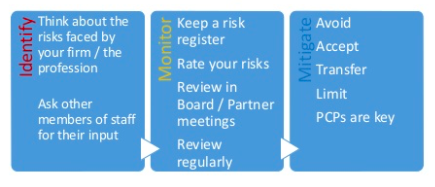What Should Be In Your Risk Register? [Free Template]

Our webinar training session was this week focused on Risk Management for law firms. (The slides are available here if you are interested). A key part of the training was around the risk register.
In the session we talked about Identifying, Monitoring and Mitigating risks that arise in practice, whether they are “big picture” or “targeted” risks.

- “Big Picture” risks are the types of risks that affect all law firms, such as Anti-money laundering, protecting client money and cybercrime. They would also include business continuity risks.
- “Targeted” risks are those which are more relevant to your particular firm. This would include firm culture, your practice areas, client base and file-specific issues.
Why you need a risk register
A risk register is a simple tool that allows you to prioritise and manage risk that you have identified. It is also the centrepiece of the Monitoring part of risk management.
Without a risk register, you would struggle to persuade the SRA (and possibly insurers) that you have complied with your duty to:
“identify, monitor and manage all material risks to your business” (para 2.5 of the SRA Code of Conduct for Firms)
There is no single best format for a risk register. There are lots of different versions around.
Our free template (in Excel format) can be downloaded below.
- Sheet 1 contains the risk register itself. This is intended to be a live document, updated and reviewed regularly.
- Sheet 2 is the risk matrix (in 5×5 format). This is your way of scoring and prioritising risks.
- Sheet 3 suggests some categories of risk – you might have your own which are more relevant.
- Sheet 4 gives some instructions to help populate the risk register.
Done correctly, a risk register is both an incredibly useful risk management tool as well as a valuable audit trail.
Get the free risk register template
3 options for working as a self employed solicitor

So, you have made a bit of a name for yourself, mastered your craft and have amassed a book of potential clients. Working from home is actually quite pleasant and you don’t miss that commute.
You want to strike out on your own, but what are your options?
Essentially, you have 3: start your own firm, join a firm as a fee sharing solicitor, or become a freelancer.
News and Guidance

Law Society Updates
- New practice note on Price and Service Transparency – a comprehensive roundup of the SRA Transparency Rules. Is it time to review your website? You know the SRA is actively looking for offenders and they have become less tolerant of excuses.
Other updates
- Five-star Trustpilot reviews becoming “hygiene factor” not differentiator (Legal Futures) – If all that the 5-star results tell us is that those at the top of the list are better at “online reputation management”…maybe review sites aren’t the silver bullet to improve service/access.
Webinar training

Thanks to everyone who attended this week’s webinar on Risk Management (a record attendance!). The slides are below and the Zoom recording has been sent out to those who registered. (Get in touch if you would like access).
Next month’s training is going back to basics, with a session on confidentiality and conflicts. An oldie but a goodie. The registration email will come around in due course and you may want to circulate around your firm.
JBL clients get priority, then we open up any remaining slots to a wider audience closer to the time.
Disciplinary decisions

- Brian Milner-Lunt – High court rejects appeal against SDT strike off for over-charging. It was reasonable for the tribunal to find the former sole practitioner dishonest in charging an estate eight times the costs he was entitled to.
- Peter Gray – City litigation partner struck off for misleading the Court and opposition regarding a freezing order.
- Ashgar Ali – fined £35k (and restricted from practice) for lack of integrity in “turning a blind eye” to obviously suspicious PI claims.
- Thomas Ponsonby – section 43 (banning) order for paralegal who forged client’s signature on a consent form.
- Ben Moore – section 43 order for probate manager who accepted a £20k gift from a vulnerable elderly client, without informing his employer or advising the client to take independent advice.
- Donna Marie Bibby – section 43 order for dishonesty withholding a conviction from her employers.
- Olusola Oyediran – section 43 order for immigration case worker who dishonestly represented that an application had been made to the Home Office when it had not.
- Emma Beddows – section 43 order for non-solicitor head of private client department who misappropriated almost £100k from estate accounts.







